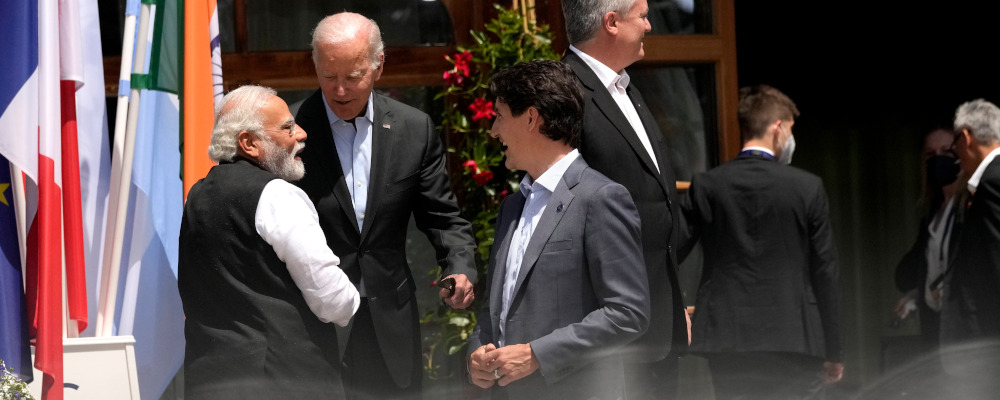The Partners in the Blue Pacific (PBP) initiative,Establishing the Partners in the Blue Pacific (PBP): joint statement https://www.gov.uk/government/news/joint-statement-on-the-establishment-of-the-partners-in-the-blue-pacific-pbp the Quadrilateral Security Dialogue,Defining the Diamond: The Past, Present, and Future of the Quadrilateral Security Dialogue https://www.csis.org/analysis/defining-diamond-past-present-and-future-quadrilateral-security-dialogue AUKUS,FACT SHEET: Implementation of the Australia – United Kingdom – United States Partnership (AUKUS) https://www.whitehouse.gov/briefing-room/statements-releases/2022/04/05/fact-sheet-implementation-of-the-australia-united-kingdom-united-states-partnership-aukus/ and the Indo-Pacific Framework (IPEF)The Indo-Pacific Economic Framework: What it is — and why it matters https://www.cnbc.com/2022/05/26/ipef-what-is-the-indo-pacific-framework-whos-in-it-why-it-matters.html have two things in common. First, they are meant to contribute to sustainable institution building in the Indo-Pacific, and second, Canada is not part of any of these mini-lateral arrangements.
Considering Canada is a G-7 country, is part of the Five Eyes Network, and is participating in maritime security operations in the Sea of Japan through the Neon Operations to ensure that North Korea does not evade sanctions, its absence is conspicuous.
Why is Canada being excluded from these emerging institutions in the Indo-Pacific region? Why is Canada not seen as a second or third choice for these emerging institutions that are providing the framework for institutional building within the Indo-Pacific?
There are possibly three explanations for Canada’s absence: 1) political leadership; 2) domestic literacy about the importance of the Indo-Pacific region and how that translates into Indo-Pacific policies; and 3) credibility.
First, political leadership matters. This means the prime minister, vice premier, foreign minister, and defence minister should be crafting a foreign policy for the region that links Canada’s national interests to the evolution of the region. Here, Canada has an enduring interest in ensuring that the region is stable and open for trade. This means institutions and rules that are adopted in the region are in line with Canadian interests and provide Canadian businesses with open access to the region’s economy.
Foreign Minister Mélanie Joly and Defence Minister Anita Anand received mandate letters to develop a Canadian Indo-Pacific Strategy in December 2021. In June 2022, Canada’s Indo-Pacific Advisory Committee was formed to contribute to formulating a strategy. This comes more than a year after the May 2021 Shared Canada-Japan Priorities for contributing to a Free and Open Indo-Pacific.
Others such as Mark Agnew, the Canadian Chamber of Commerce Senior Vice President, Policy and Government Relations, have appeared at the House of Commons Standing Committee on International Trade, stressing that in “an Indo-Pacific Strategy, the elements that pertain to China will be critical. It is important to be clear-eyed about the size of the market and of course the geopolitical challenges. How we engage with China needs to have intelligently balanced considerations and it must be anchored around cooperation with allies.”
Agnew’s comments stress that China should be part of an Indo-Pacific strategy, not the Indo-Pacific strategy, and echos Canadian Indo-Pacific thinkers such as Jonathan Berkshire Miller, Kenneth Holland, Maxandre Fortier, Marco Munier, and Justin Massie.
Aggregating Indo-Pacific writing, there seems to be consensus, in one way or another, around key pillars that include: 1) middle power diplomacy; 2) climate change; 3) inclusive development; 4) energy and critical minerals security; 5) economic security and resilience through infrastructure and connectivity; 6) maritime security.
Another important area that would be important is supporting Canadian businesses within the Indo-Pacific region through enlarging the CPTPP,Comprehensive and Progressive Agreement for Trans-Pacific Partnership (CPTPP) https://www.international.gc.ca/trade-commerce/trade-agreements-accords-commerciaux/agr-acc/cptpp-ptpgp/index.aspx?lang=eng deregulation, and being part of the standard-setting for key technologies that will shape the region’s economy, governance, the relationship between the state and citizens, privacy, AI, quantum computing, and cyberspace.
Second, domestic literacy about the importance of the Indo-Pacific region and how that translates into Indo-Pacific policies. The MacDonald Laurier Institute (MLI) and Asia Pacific Foundation (APF) have both conducted research on Canadian views of the Indo-Pacific (Asia-Pacific).
MLI’s findings suggest that “For countries that share Canadian interests, values, and systems of democratic governance, there are significant opportunities to strengthen ties and public perceptions of these alliances in East Asia.” Similarly, the APF National Poll found that Canadians were warming to like-minded democratic states, were significantly cooling on China, but, overall, recognized the importance of Asian economies to Canada.
Neither poll investigates the Indo-Pacific/Asia-Pacific literacy amongst respondents, and this may be part of the crux of the absence of a Canadian Indo-Pacific Strategy. For the average Canadian and Canadian business, there is little if no difference in using the terms Indo-Pacific, Asia-Pacific, or simply Asia.
They primarily see the region through trade opportunities and, importantly, Chinese belligerence after the hostage diplomacy incident following the arrests of Michael Kovrig and Michael Spavor. These negative perceptions have been worsened with the onset of the COVID-19 pandemic in Wuhan, substantiated reports on so-called Uyghur reeducation camps, and the crushing of the One-country/ Two-systems model for Hong Kong after the adoption of the 2020 National Security Law.
This lack of literacy in regard to the entire region contributes to the lack of focus of Canadian politicians in crafting an Indo-Pacific Strategy.
Third is credibility. The 2022 annual CFPJ Trudeau Report Card produced by David Carment and graduate students at Carleton University’s Norman Paterson School of International Affairs, in consultation with experts throughout Canada, highlights that the “government’s diplomatic performance is hampered by rhetorical overreach, squandered opportunities, failures to engage, hypocrisy, and irrelevance. The most recent example of Canada’s fall from grace is its glaring absence at the Oslo talks on Afghanistan.”
In a similar vein, the Institute for Peace & Diplomacy spearheaded an open letter including the voices of 40 Canadian scholars, experts, and former diplomats stressing that “if Canada continues to marginalize the vital role of foreign policy discussions at home, it risks diminishing its ability to secure its way of life and prepare for an increasingly uncertain world.”
This credibility gap is not just at home. As a growing number of countries put forth their own Indo-Pacific strategy, the common refrain is where is Canada? What is Canada doing? How will it distinguish itself from the U.S. and be sustainable?
These sentiments are exacerbated by past intransigences such as the last-minute walk-out from the original TPP signing in Danang in November 2017 or its penchant for advocating for a progressive agenda in trade deals, resulting in failures such as the Canada-China FTA.
The way forward is clear. Political commitment to securing Canada’s proactive and sustained role in the Indo-Pacific through a clear articulation of Canadian interests in the region.
Getting Canadian buy-in will require leaders to succinctly and simplistically explain why the region is important for Canadians. For example, outside of North America, the Indo-Pacific region presents the largest economic opportunity for Canadians. We have a direct interest in ensuring the region remains rules-based, open, and stable.
Lastly, we have to rebuild credibility through a sustained diplomatic, economic, and security engagement in the region built around like-minded allies and institutions. The Partners in the Blue Pacific (PBP) initiative, the Quadrilateral Security Dialogue, AUKUS, and the Indo-Pacific Framework (IPEF) are excellent points of engagement to demonstrate Canada’s commitment to the region.
Recommended for You

‘A fiscal headache for Mark Carney’: The Roundtable on how Trump’s One Big Beautiful Bill could affect Canada

‘You have to meet bullying with counter-bullying’: David Frum on how Canada can push back against Trump’s trade negotiation tactics

Need to Know: Mark Carney’s digital services tax disaster

Sean Speer: Investing in critical minerals isn’t just good business, it’s a national security imperative



